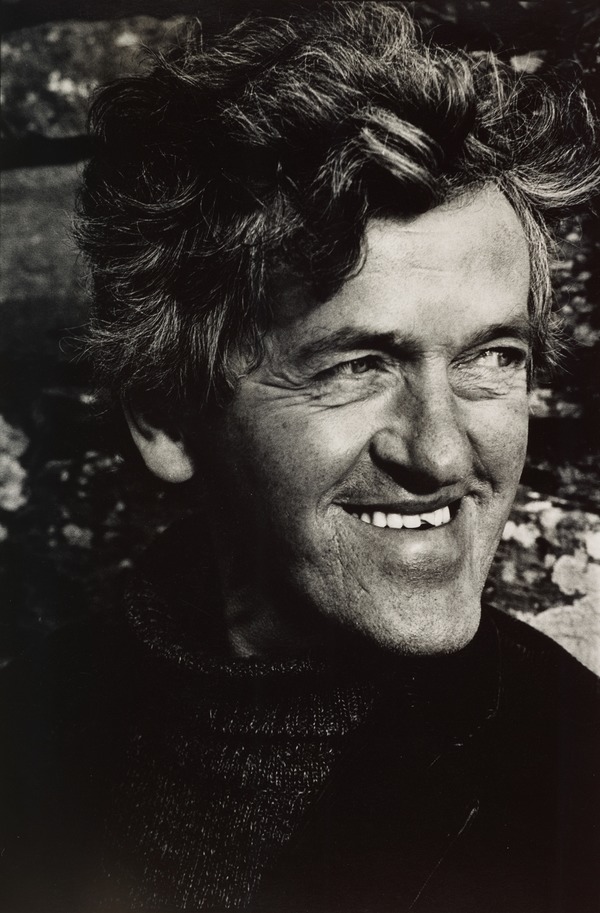
A Topical Letter
On 27 November George Weigel published an open letter to JD Vance. It is worth re-reading now. Weigel, ‘speaking as one Catholic and one patriot to another’ wrote: ‘If our country is to experience a new birth of freedom rightly understood, it will be in part because our leaders remind us of what Lincoln called the “better angels of our nature,” rather than salting the wounds of our animosities.’ He then said: ‘It is unworthy of a serious American public official to say that he or she really doesn’t care what happens to Ukraine. Why? Because crass indifference to injustice and suffering is ignoble. And because what happens in Ukraine is directly related to our national security and to world peace.’
You can find the complete text here.
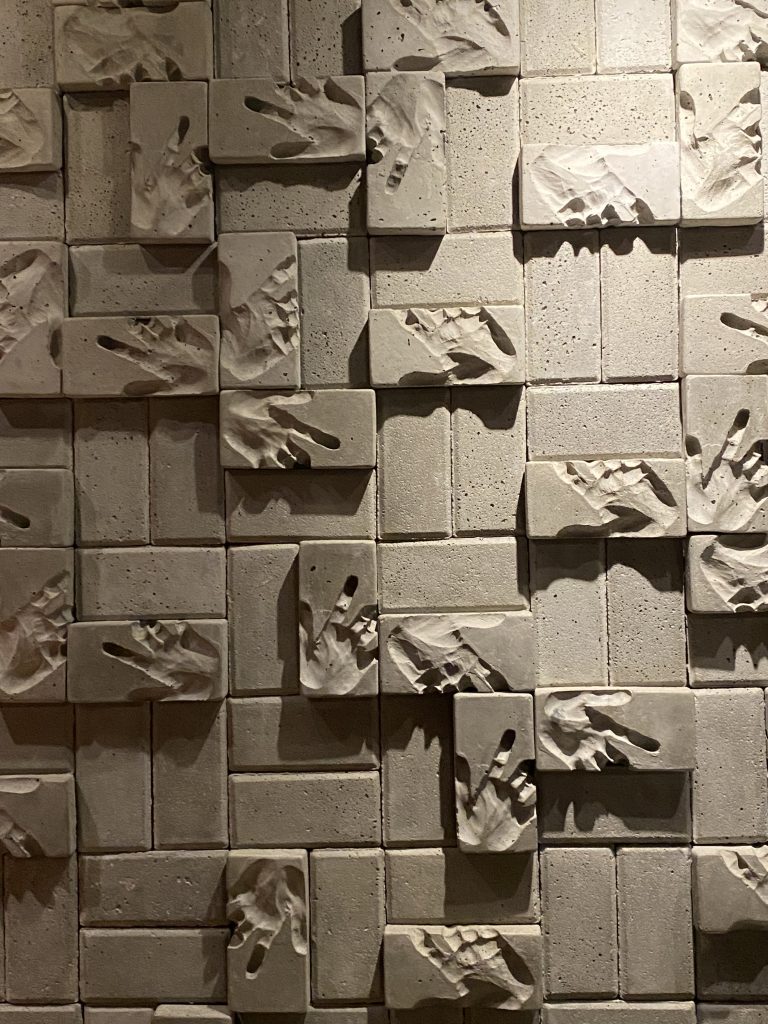
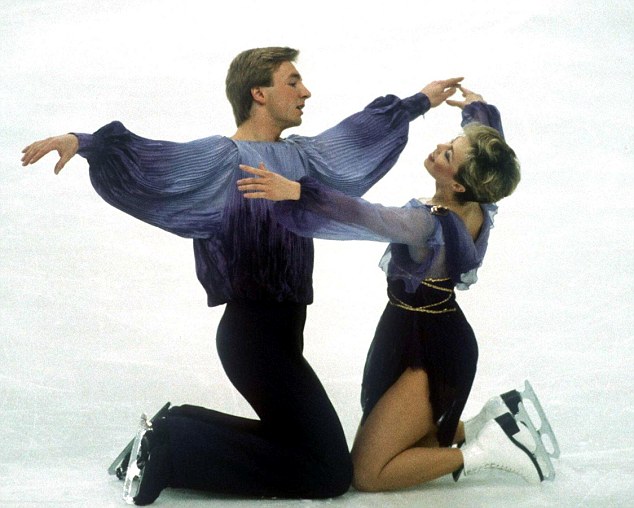
Boléro
A careful reader of Chastity, noting in particular the section suggesting that ‘perhaps no form of concrete human enterprise grants a premonition of the body’s possible ascent towards transcendent beauty more clearly than dance’, recently sent me a ‘footnote’ remarking on ‘Torvill and Dean dancing on ice to Ravel’s Bolero at the 1984 ice-skating world championships, when they gained perfect marks from all the judges, an unheard-of achievement. Art, through discipline and music, sets the body free and lifts those present to heaven, don’t you think?’ I do, but didn’t know this performance, so sought it on the Olympic Channel. It is jaw-dropping and wonderful. Watch it here.
Charles V
The resignation of Charles V, Holy Roman Emperor, in 1556 is the stuff of myths. He, one of the modern world’s most powerful rulers, withdrew to the monastery of Yuste in Extramadura, where he hunted and fished and rode his horse practically into his apartment, yet lived a retired, penitent, prayerful life, with a view onto the Hieronymite monks’ high altar from his bedroom. The mere idea that absolute power might in fact be relative, subject to a higher good and a higher aspiration, challenges us – and is a salutary subject for reflection in the world right now. August von Platen-Hallermünde wrote in a poem dramatising Charles’s retirement: ‘The head that stoops unto the scissors now/Under the weight of many crowns did bow.’ The tonsuring may be a legend. The image remains pertinently real, immortal. The German text is here.
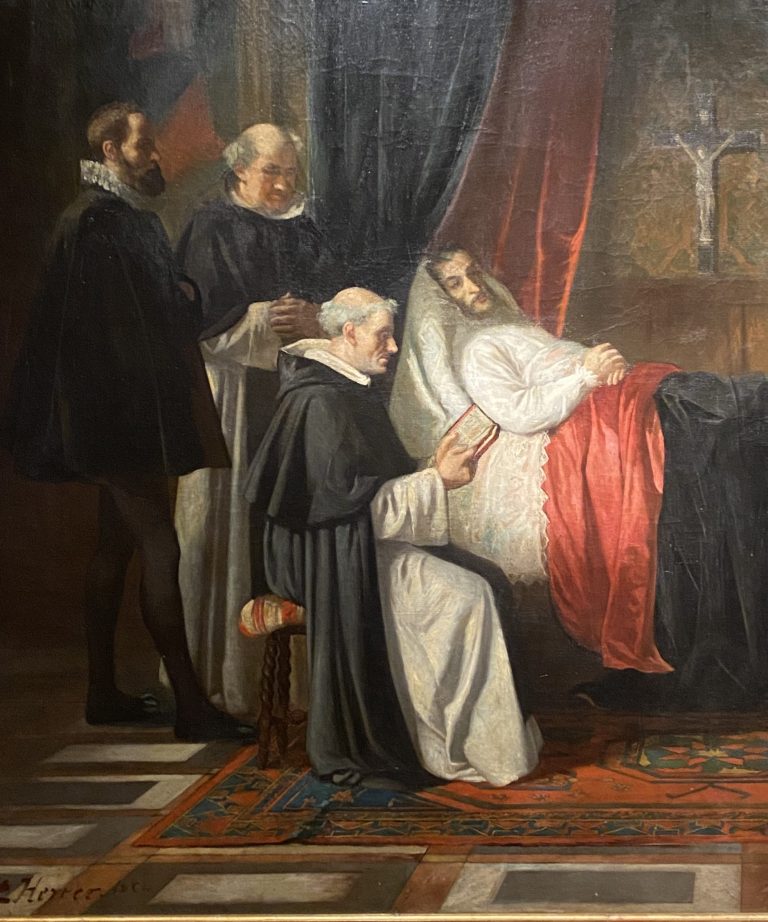
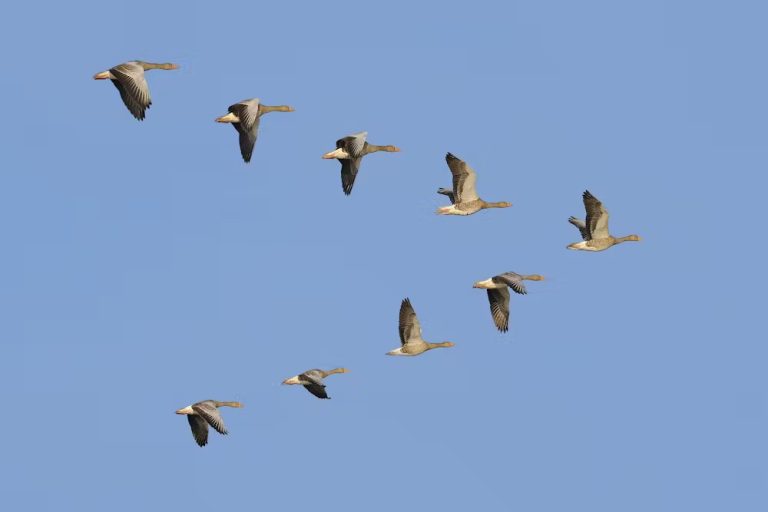
Countering Blandness
‘It’s rare for me to hold a fashionable position’, writes Tracey Rowland disarmingly, only to remark that she is delighted to be in the company of (other) various high-profile people ‘who all recommend making Christianity “weird” again’. At stake is the collectively dawning realisation that the cause of faith is not served – has it ever really been? – by a pastoral strategy set to correlate it to the culture of modernity. It is time to insist, again, on the difference Catholic Christianity makes hermeneutically, ontologically, ethically, aesthetically. Rowland concludes: ‘The penetration of the natural by the supernatural is not banal, is not boring, is not a matter of bourgeois conformism. For the Catholic it’s beatific and for the unbeliever fascinatingly weird and different—and it’s what we need now as an alternative to a bland materialist cosmology.’ It is worth reading the whole piece, which you can find here.
Where Are You?
The lectionary for today gives us the reading from Genesis 3 about God confronting man after the Fall. Having disobeyed God’s command, Adam hides among the trees, covering himself with stuff. Created to look towards God and to be sustained by that gaze, he cannot any more bear to be seen. His hiding is a spontaneous response, not the result of divine condemnation. An ancient Midrash explains that God’s question, ‘Where are you?’, was asked out of consideration for Adam, to afford him time to recover his self-possession. God, the omniscient, needed no information about Adam’s whereabouts. We can draw a lesson from this. The question, ‘Where are you?’, is, according to the nineteenth-century exegete August Dillmann, ‘the call that, after every sin, resounds in the ears of every man who seeks to deceive himself and others concerning his sin.’ Am I still sensitive to that question, to the extent of my estrangement from God, from myself?
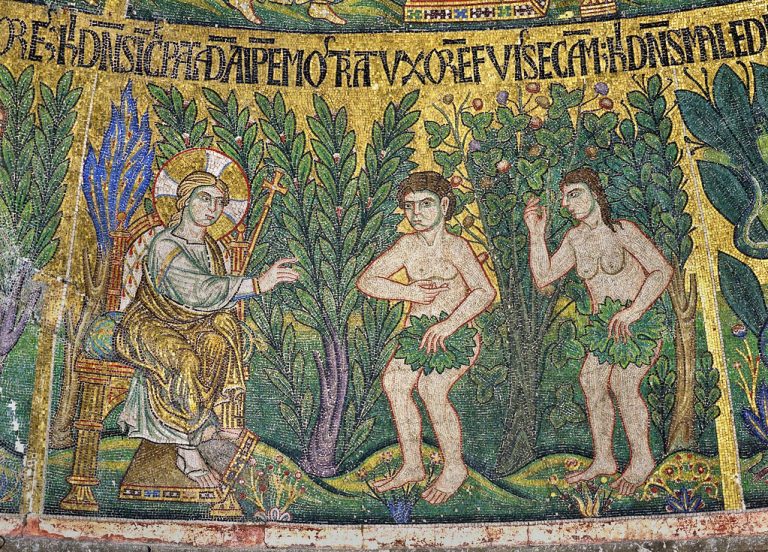
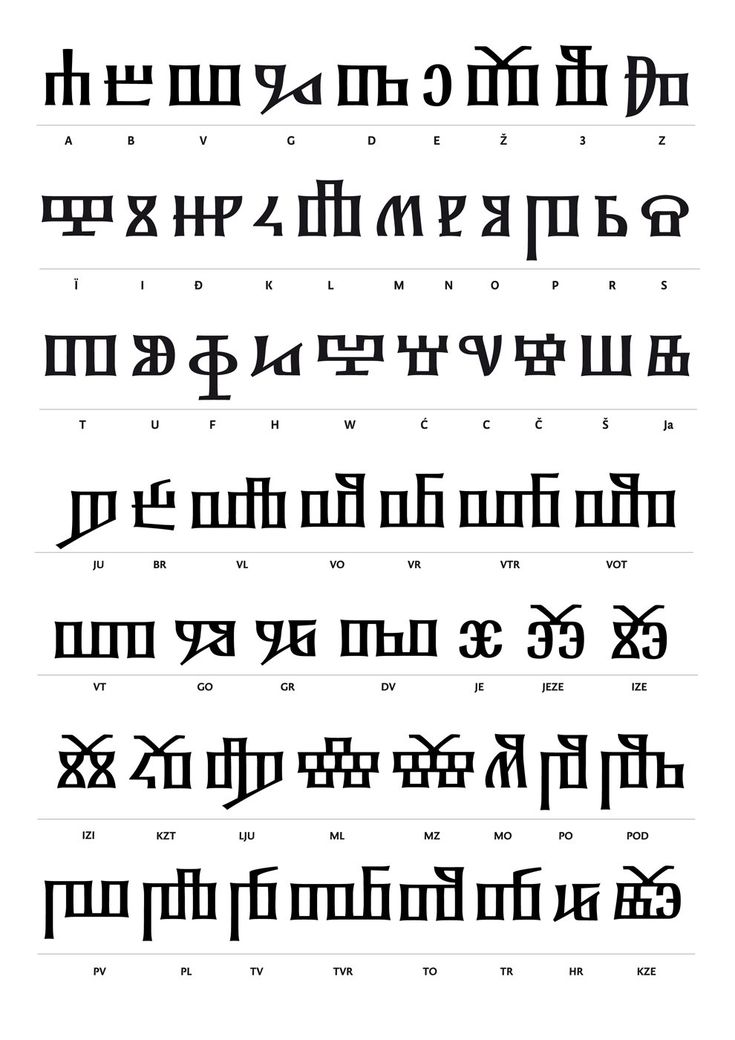
Alphabetisation
The blood brothers Cyril and Methodius are examples of missionary zeal. They left their homeland to witness abroad to the newness of life in Christ. They displayed the Christian virtues to a heroic degree. They also served the cause of culture. We still call the alphabet used by the Eastern Slavs ‘Cyrillic’ after St Cyril, a brilliant linguist. You might say that the cultural impact was incidental. Cyril’s concern was to find a way to codify liturgical texts and to write up a translation of Scripture. But these sources became the foundation of culture. In the West today we lack a common language. Our society is atomised. We struggle to talk with one another, so violence erupts. Let us not underestimate the task of alphabetisation which pertains to us, as Christians, today. We have the only adequate tool. Christ, the Word of God, in whose image we were made, is not only Alpha and Omega, but all the letters in between. In him we find what it takes to make sense of ourselves and of the lives we live.
Pietas
‘For if the dark places of the earth have always been full of the habitations of cruelty, there has always been a spring of mercy in mankind. The Roman virtue of pietas is the strong root from which our pity, in every sense, derives. Religion has had its own savageries: yet even the arbitrary Godhead of the Book of Job was concerned for the young ravens wandering from the nest for lack of meat, and it was Christ’s claim that a huddle of feathers on the ground was not unregarded by the Father of mankind. “With Christ”, said Sulpicius Severus, “every brute beast is wise, and every savage creature gentle”: and St Kevin refused the levelling of the mountain about Glendalough to make his monks rich pasture, because he would not have God’s creatures disturbed for him. In the first paradise that lies behind the memory of the world, there was no cruelty: and when Isaiah, sick of war, made his poem of the golden world, the climax-vision was a holy mountain where “they shall not hurt or destroy”.’ It is good to be reminded.

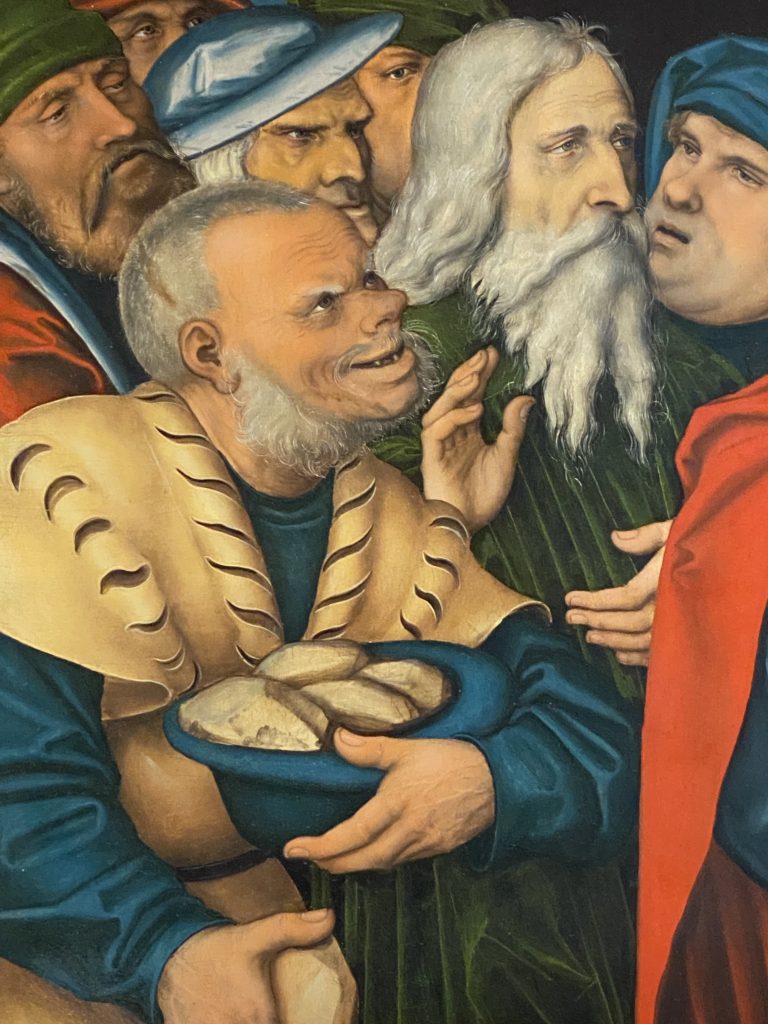
Stone Ready
Lucas Cranach’s Christ and the Adulteress is a formal representation of the scene from John 8 with the various participants tidily lined up as for a graduation photograph. The structural formality belies an extraordinarily rich range of character studies. I am struck by this man, lustfully ready with a hatful of stones to throw at the woman denounced, with a sharp-edged one set in his right hand. He is clearly more than happy to be the first to step forward; he will not have been among the first to go away (8.9). The stupidity of judgemental vengefulness, the deformity wrought by this passion, is written on his features, which stand out in contrast to those of the venerable white-bearded elder at his left elbow whose hand is raised in a gesture of caution. Is there a trace of such violence in my heart? Cranach’s study lends itself as an aid to examination of conscience.
Seeing Light
Enjoying a free morning in Stockholm on the way home from pilgrimage, I saw a poster advertising an exhibition of works by Lars Lerin at Konstakademien. I went. I am glad I did. To stand before one of Lerin’s canvases is to begin to learn what it is to see the world with an illumined eye, with gentleness. Many of his paintings are from the North of Norway. He once wrote: ‘It seems like a waste of a life to live anywhere other than in the Lofoten Islands. If possible, I am even happier here in winter snow and darkness than when exposed to the sun’s x-rays. During the dark season, when the sun never rises above the horizon, the bright points of life acquire special significance.’ He shows us how, as in this jubilant representation of the harbour in Henningsvær – and even in paintings of the interiors of fisheries.
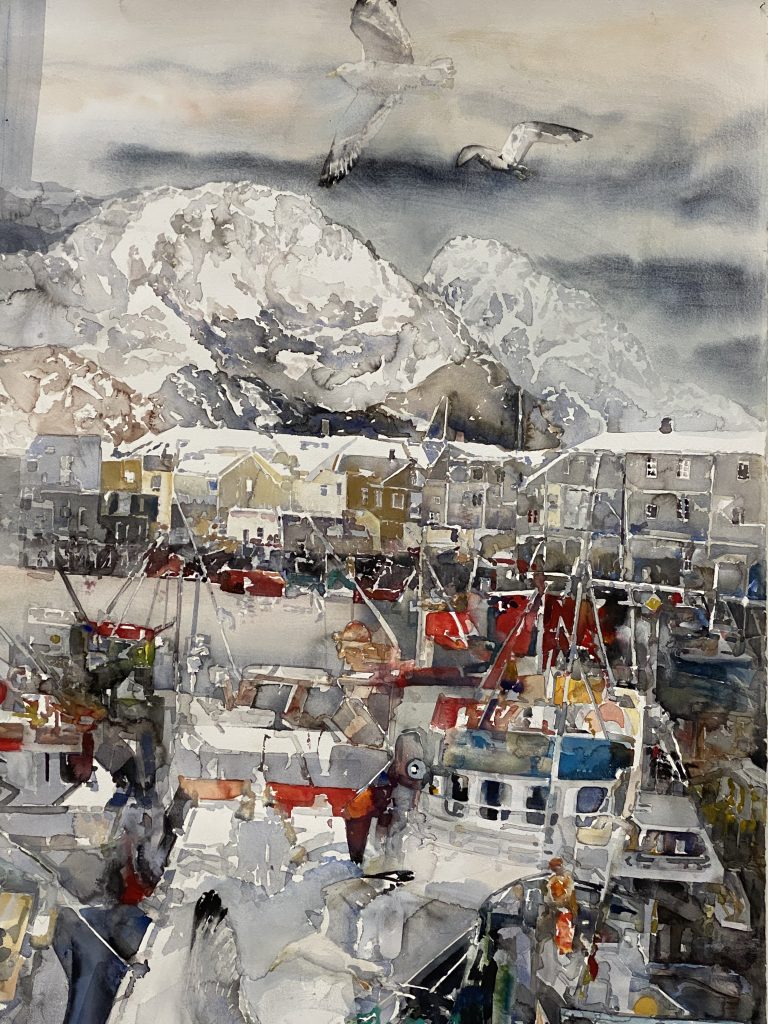
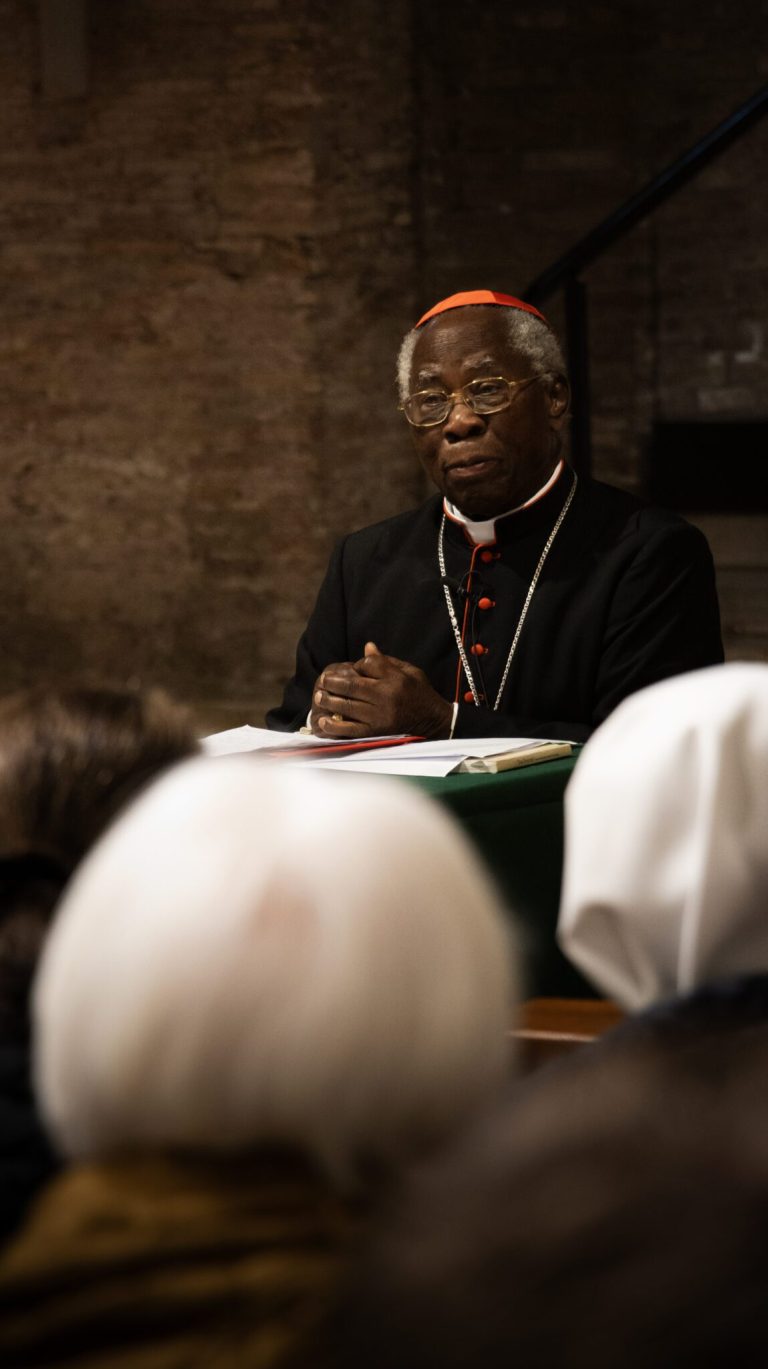
A Saint for Our Times
‘Who is Father Tansi?’, asks Cardinal Francis Arinze in the preface to his 2015 book Total Response: Personal Memories of Blessed Iwene Tansi, before going on to describe him as ‘a man never settling down to half-measures, dissimulation, pride or love of convenience, but always self-mortified and ready to put his whole heart and person into what he was doing’. On our pilgrimage to Rome last week, we had the privilege of hearing the cardinal speak to us about this man, a remarkably effective, greatly esteemed Nigerian priest who became a monk of my community of Mount Saint Bernard Abbey in 1950, and was beatified by St John Paul II in 1998. You can listen to Cardinal Arinze’s talk here. You may also be interested in this homily about him, preached at Gethsemani in 2022.
Turtles
The Norwegian pilgrimage to Rome is a source of many joys. You can find pictures and videos here. It is an immense gift for us to have this time together – and with groups from the other Nordic Countries. Though still fairly quiet, Rome is abuzz with jubilee exhilaration. The city has accomplished remarkable feats, including the splendid new pedestrian area between Castel Sant’Angelo and the Via della Conciliazione. In the midst of all this movement, though, I keep thinking of a scene observed in the Vatican Gardens on Wednesday: a turtle arrested in quiet contemplation of its fellows rather alarmingly suspended in an ancient freeze – a kind of reptiles’ memento mori, a reflection on transience. Generations of Vatican turtles have seen pilgrims, movements, and fads come and go, remaining meanwhile unfussily faithful to their fountain. There’s a lesson in that somewhere, a lesson in proportion and perspective.
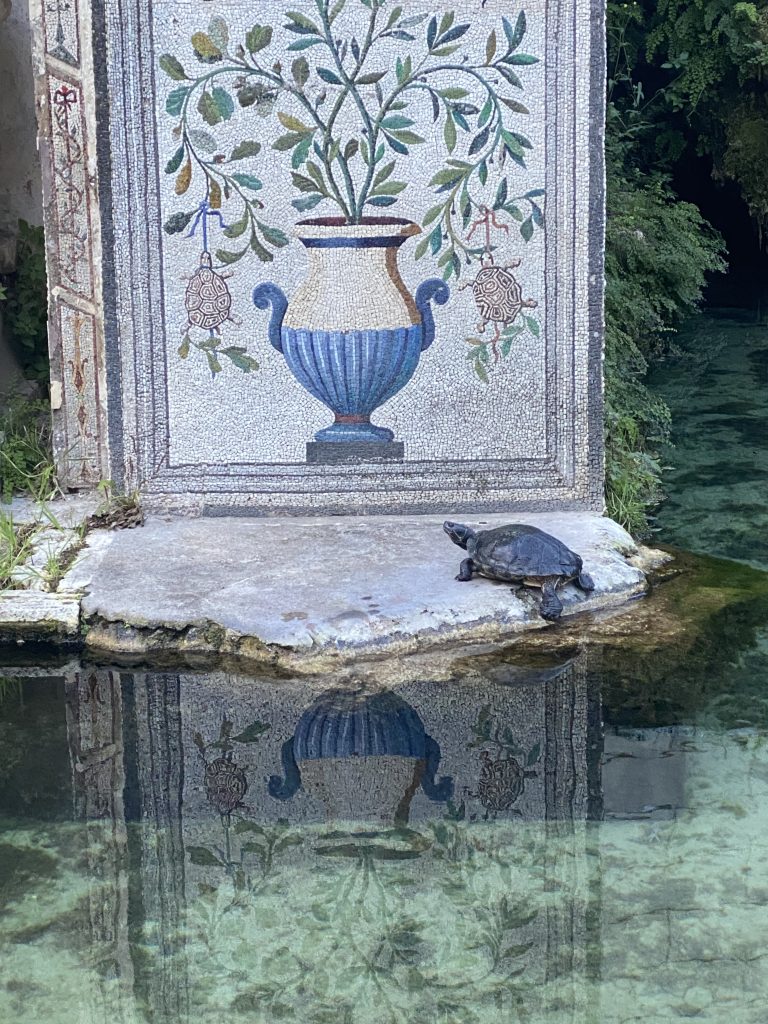
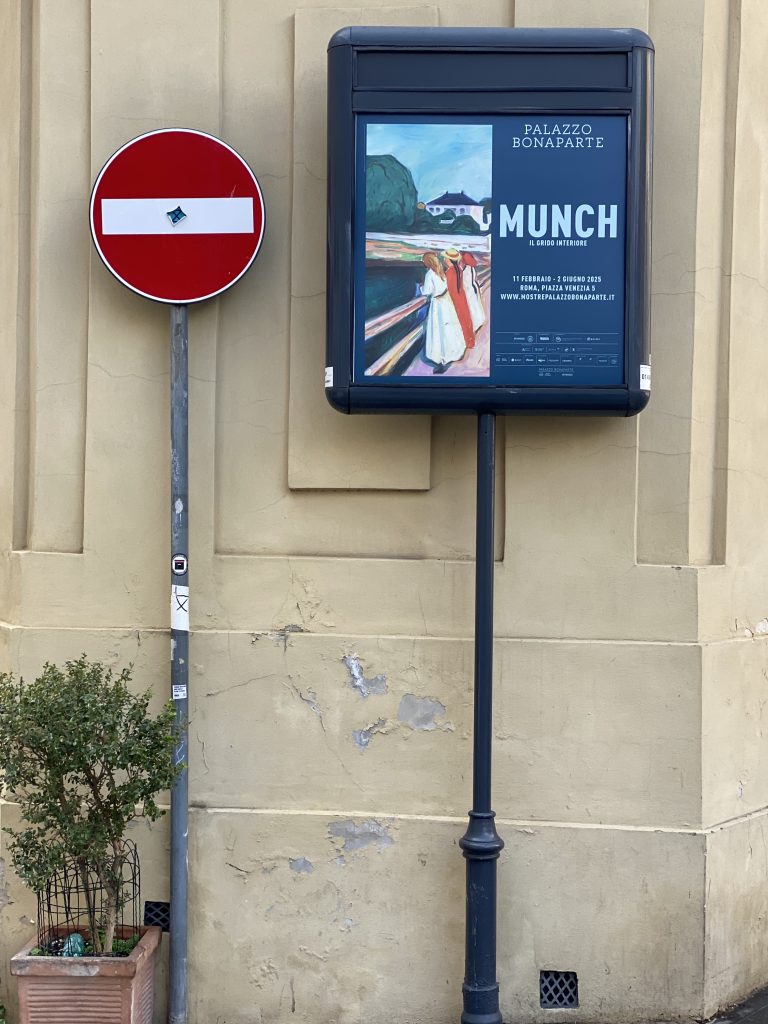
Munch on the Move
Descending on Rome these days is not only a large group of Norwegian pilgrims, but Edvard Munch. It gave me delight to see this sign as I walked down the Via Panisperna earlier. A reproduction of Munch’s painting of three young women on a bridge was once found in virtually every Norwegian home. It was incongruous and wonderful to find the girls looking out, not unto a fjord but unto a Roman no-entry sign, casually observed by motorists. They looked at ease. Apart from personal nostalgia, the sight of this Northern motif in the ancient capital of the imperial South, advertising a show in the Palazzo in which Napoleon’s mother ended her days, inspired this thought in me: there is such a thing as Europe, whose boundaries are fluid, whose regional treasures complement each other, whose secret can only be perceived by those prepared to develop a horizon broad enough to take in the whole.
Dom Bernardo Bonowitz
On 19 January Dom Bernardo passed into eternity. His contribution to the monastic order was huge. A learned man, he has left writings that will endure. His vocational trajectory fascinates. His abbatial legacy continues to hear fruit. Above all, though, the course of his final years moves me to take off my shoes, conscious of being in the presence of Mystery. At Dom Bernardo’s funeral, Fr Isaac Slater said that ‘the symptom [of Lewy Body Dementia] he found most difficult was the “mutism” which left him unable to speak. More than once I saw him chatting away on the phone with a friend or loved one—conversations that brought him so much joy and encouragement— then just a few minutes later speechless and filled with dread. He was such a talker—a charmer, a storyteller, a comedian—that losing the ability to speak was especially painful. Once when he had said barely a word for maybe six or seven months, he indicated that he’d like me to read to him and selected Wordsworth’s Prelude. I started to read and paused after some time to see if he wanted me to continue. He gestured for me to read on and after about forty-five minutes, he began to speak. It was like a kind of miracle. He spoke for three hours touching on all that was most delicate and difficult in his condition.’ You can read Fr Isaac’s text in its entirety here.
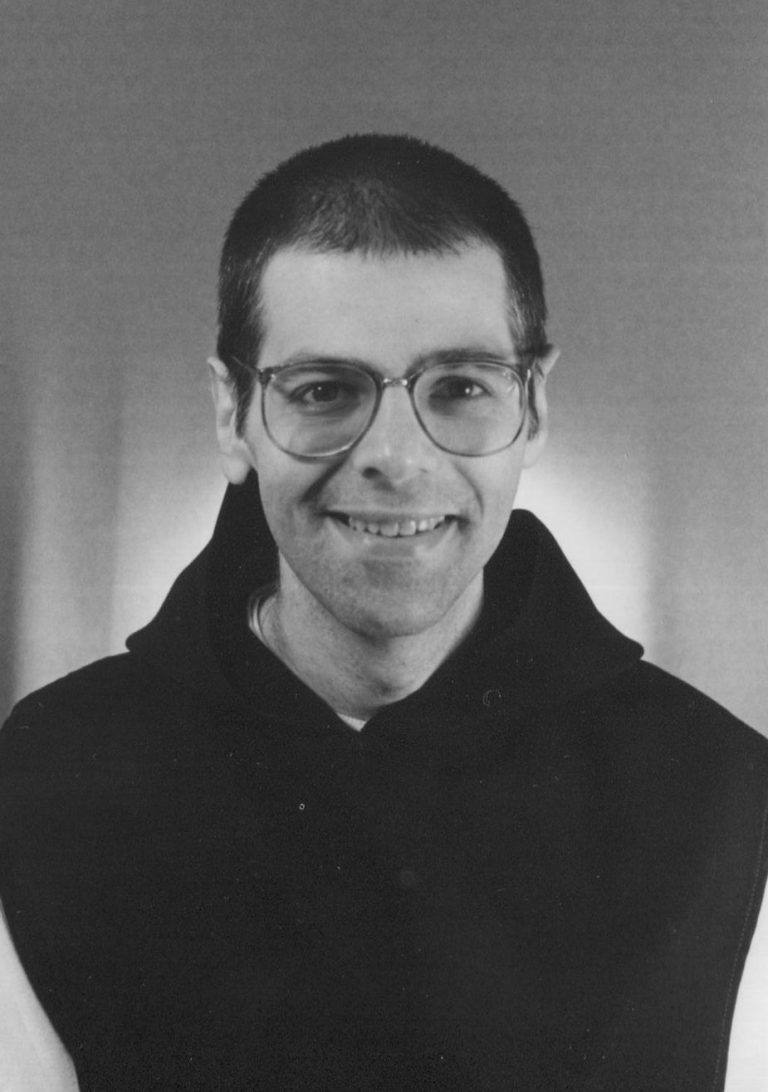
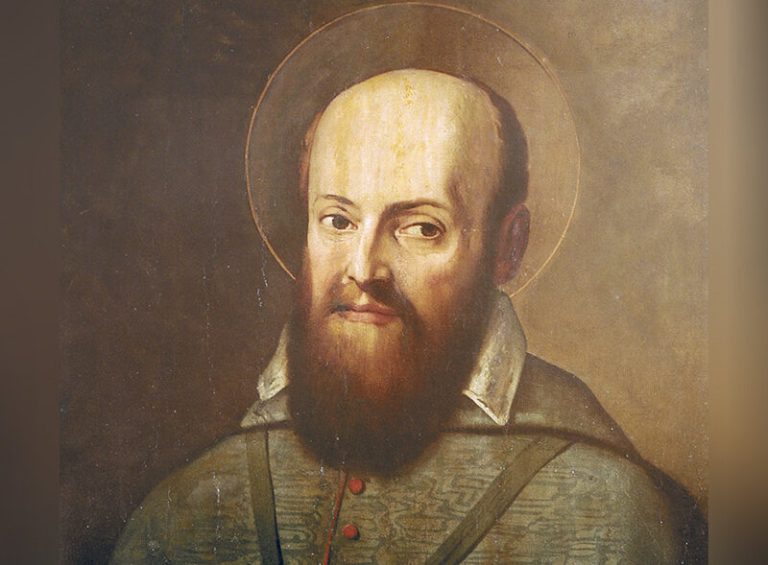
Government
Not long ago I travelled through Chambéry and Annecy, places inextricably caught up with the name of St Francis de Sales and thereby imbued with sweetness. Looking through a life on this his feast day, I find myself pausing over a counsel he once gave to the superior of a community of nuns: ‘The most perfect government is that which most closely approximates to Providence. Providence is peaceful and tranquil in the midst of all that happens. Even at its most active it is not overwrought; it takes all things in hand.’ I think, too, of a letter he wrote in 1602 to the young Pierre de Bérulle, rather given to scruples. The bishop of Geneva told him kindly, ‘We shall ever be in need of having our feet washed, for we walk in the dust.’
Neobiotopathy
Having read the story of Caramel, an eight-year-old male cat living in an undisclosed location in France, diagnosed by his veterinary psychiatrist, Claude Béata, as suffering from neobiotopathy, that is, ‘suffering connected to newness in a cat’s environment’, I felt sympathy for the poor beast, of course. At the same time, knowing a thing or two about cats (though never having trained as a feline counsellor), I imagined Caramel miaowing disdainfully at his hebdomadosyllabic diagnosis. Fond as I am of animals, I wonder: is it not a commentary on the woeful failures of our attempt to enable peaceful, flourishing human coexistence that we are now drawn to pontificate instead on ‘the larger questions of multispecies society’? And is it not, in fact, an injustice to dogs and cats to imagine them as being like us, enclosing their mysterious perceptions into our pretentious nomenclatures?
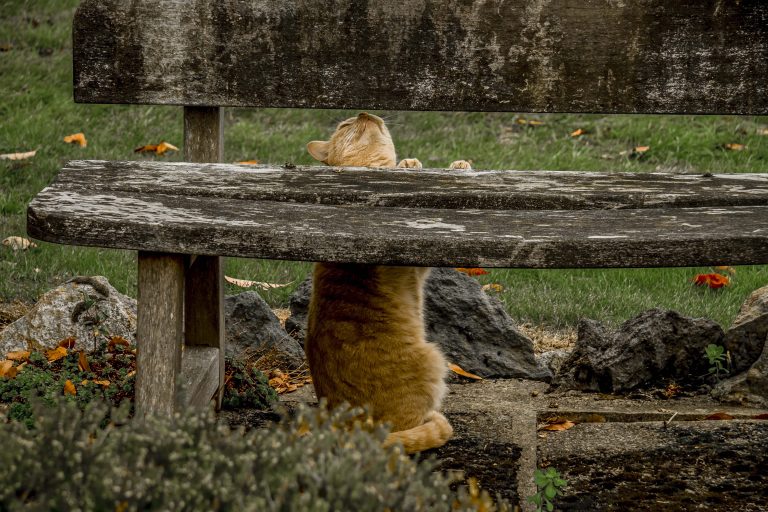

Become an Event
Recently a friend sent me a line from the Czech poet Petr Hruška: ‘Díval jsem se na strom rostoucí ve dvoře tak dlouho, dokud se nestal událostí.’ Which is to say: ‘I kept looking at the tree growing in the yard until it became an event.’ When a thing becomes an event, we are alerted to the life within it. Ceasing to be an object, it draws us into conversation, potentially a kind of communion. I think again of Dom Porion’s insight, dear to me: ‘I ascertain the riches contained in a single perspective, the outline of a mountain, say, with its pine trees in the golden glory of May, in the mists of October, or whenever. We must become the mirror of this beauty and its echo. It always reveals something new, yet every time it says it all.’ ‘I wonder’, the Carthusian asks, ‘whether travel is worth the bother.’ A pertinent question. If only I could open my eyes and see what, who, is before me now.
Strings to a Harp
Today’s official of reading offers us a wonderful passage from St Ignatius of Antioch’s Letter to the Ephesians. It provides an image of the Church by way of musical metaphor. ‘It is fitting, therefore, that you should be in agreement with the mind of the bishop as in fact you are. Your excellent presbyters, who are a credit to God, are as suited to the bishop as strings to a harp. So in your harmony of mind and heart the song you sing is Jesus Christ. Every one of you should form a choir, so that, in harmony of sound through harmony of hearts, and in unity taking the note from God, you may sing with one voice through Jesus Christ to the Father. If you do this, he will listen to you and see from your good works that you are members of his Son. It is then an advantage to you to live in perfect unity, so that at all times you may share in God.’ To live in this way, and to build up the community, we all need a capacity for careful listening that presupposes inward silence, the silence above all of self-will.
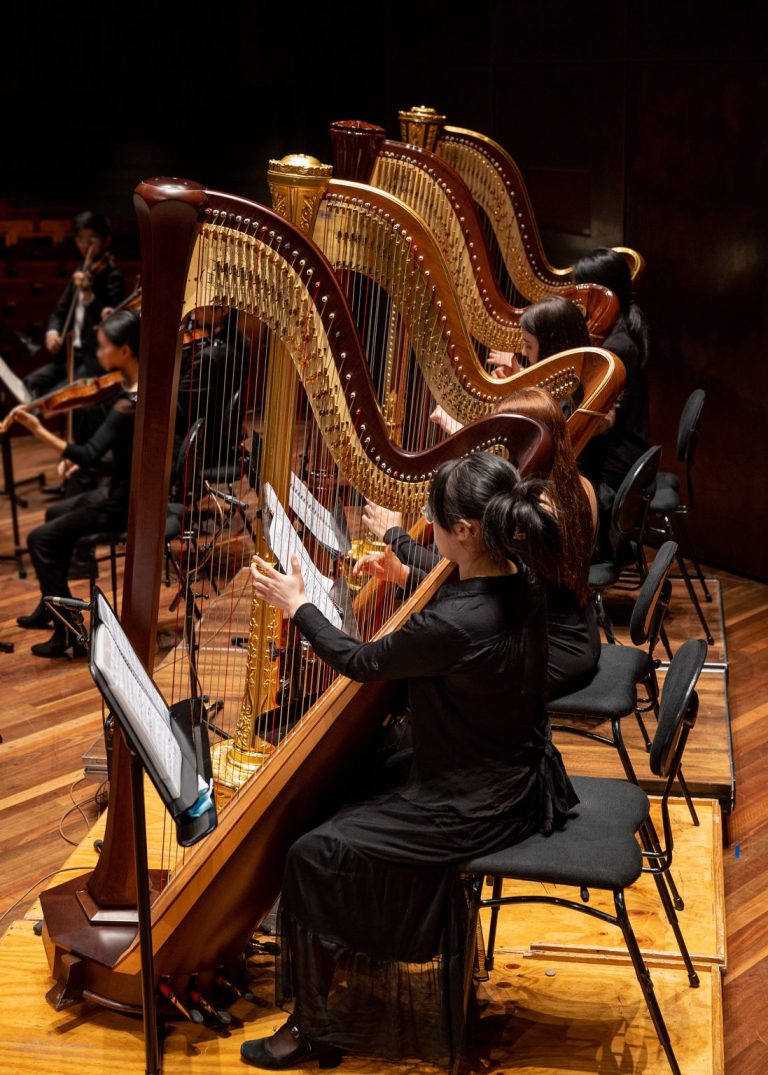
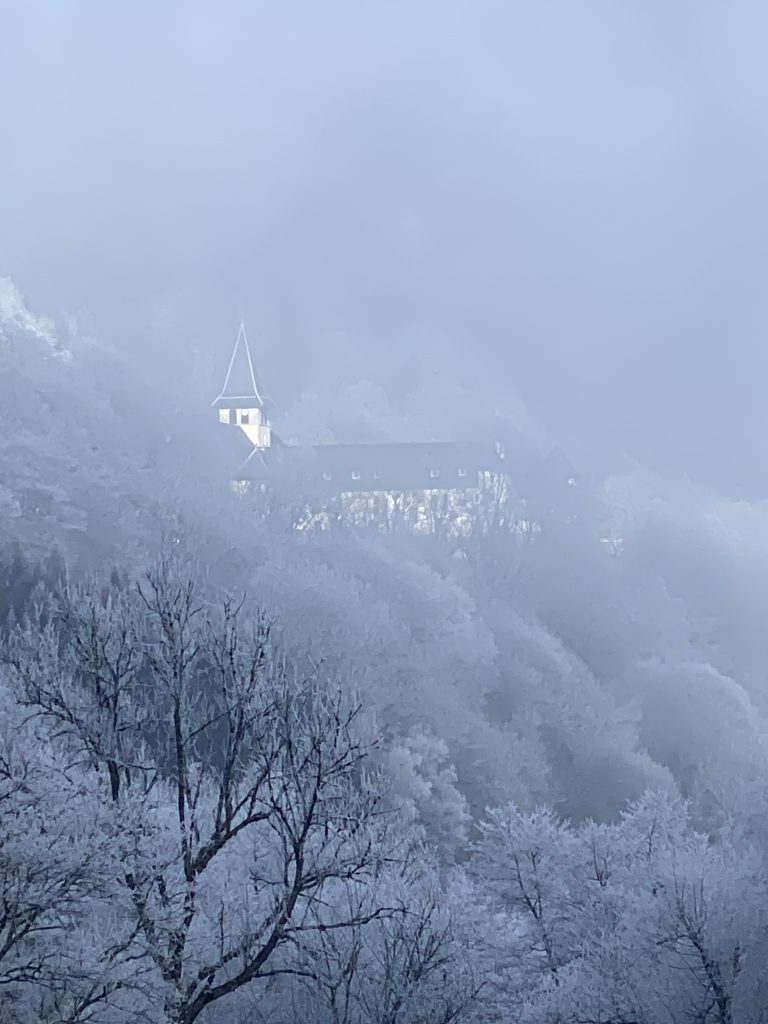
Patience
As after a gloriously azure morning clouds descend and the snow begins to drift, the abbey of Tamié nestles with perfect serenity in the mountainside 900 metres above sea level, resembling a mother bird spreading her wings to protect her brood. She has sat there for almost a thousand years. She has seen all sorts of weathers come and go. She has seen fat years and lean. ‘But the mercy of the Lord is everlasting.’ This has been the constant refrain of the monks living within her, one generation succeeding another. The words have been borne out by experience. Saints have gone forth from her, and martyrs. Even a bishop. Today she lies there discreet, almost invisible. At the opportune time her white walls will stand out in bright contrast to her green surroundings. For winter will yield to spring, and the pear trees will bloom. An image of the Church in her mystery.
Sr Chiara Picierro RIP
On the feast of the Epiphany, in our monastery of Vitorchiano, Sr Chiara died. She was wonderfully full of life. The sudden death after fulgurant illness of a young person is hard to accept. Yet one can with eyes of faith see mysterious, even lovely patterns of coherence. On making profession, Sr Chiara wrote: ‘I live fully only when utterly available to receive God’s love and to live within it. To give ALL is not only to offer what is best in me, what I think I can give; the ALL embraces my limitations, too, and my talent, my sin and my joy.’ Not long ago, knowing she was very ill, she wrote: ‘I think I can see in this business of illness a call from the Lord to grow into self-giving. To live out an offering is about more than giving something; it is about bringing to the Lord what he gives us, and to do so deliberately, embracing what he proposes.’ Sr Chiara fought the good fight, finished the race, kept the faith. Her testimony inspires. Her memory is joyful, sweet.
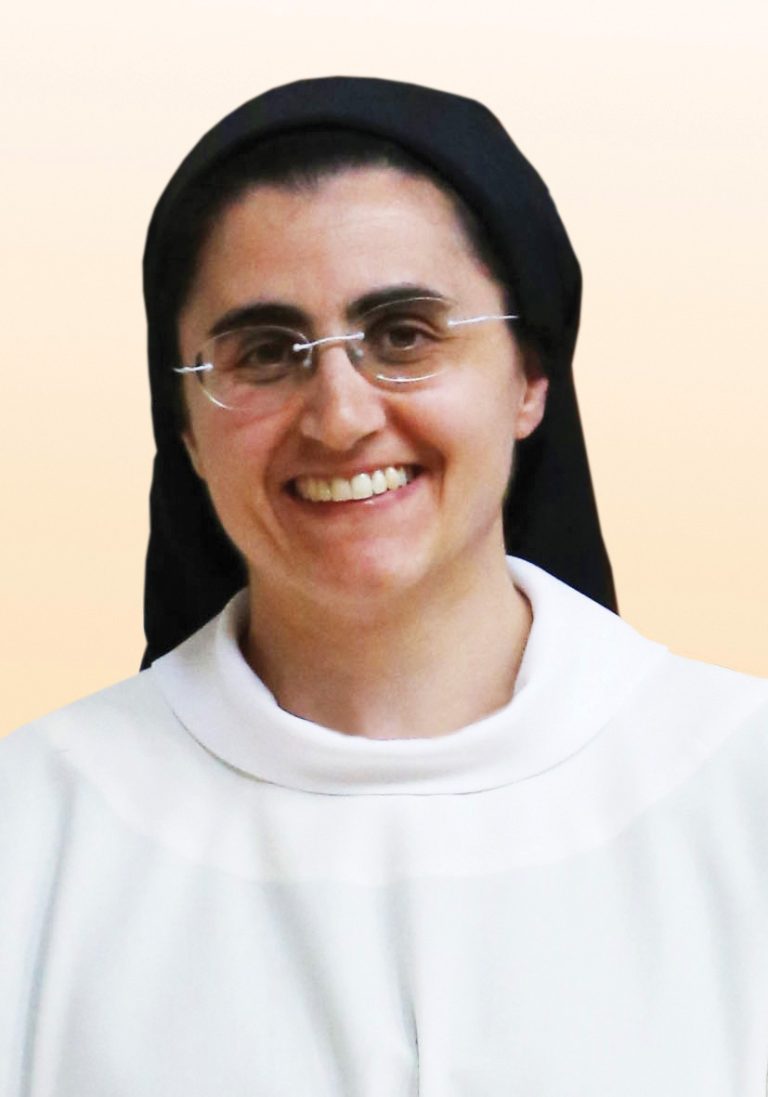
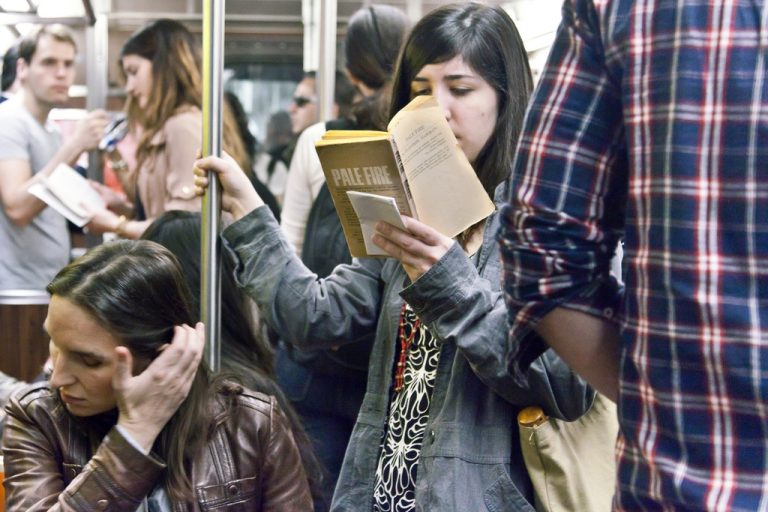
Plato in the Lift
I laughed when I read Claire Giuntini‘s list of books of the year, which begins: ‘A few months ago, I began making a mental list of what my fellow passengers have been reading on the subway. You don’t see folks reading every ride. Or even every other ride. But those who do read come from all ages and situations, and they read all sorts of things.’ For I often make the same observation travelling by public transport, and have picked up some really good clues that way. Giuntini’s confession makes my curiosity seem less culpable. She concludes: ‘The crown jewel is the man I encountered in the elevator of my apartment building, and though he was neither on a train nor actively reading, I simply must include him on my list. He sported a leather trench coat, neck tattoos, a nose ring, and—most importantly—a fancy-looking hardcover edition of Plato’s Republic, the one that bears the subtitle ‘The Heaviest Penalty for Declining to Rule Is to Be Ruled by Someone Inferior to Yourself’.’ So there.
Non-Dimensional
Thinking a lot, as I am these days, about the Desert Fathers, I recall this passage from one of Helen Waddell’s letters to her sister Meg: ‘In fact I had a sudden revelation one quiet gentle autumn day in Primrose Hill of the eternity of every moment of time. The Desert Fathers did bring eternity into men’s minds by their exaggeration of it, and contempt for the bus-stop of time. But the great thing is the conviction of eternity: and now we have the balance adjusted, and each moment is deeper than ever plummet sounded. It is this non-dimensional world that one is released into by music.’ And it strikes me, one way into this rich tradition, a bridge from our present reality to theirs, would be the Goldberg Variations.
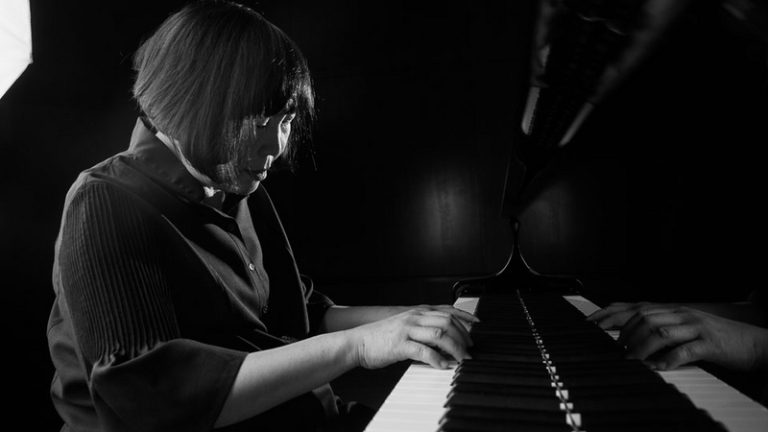
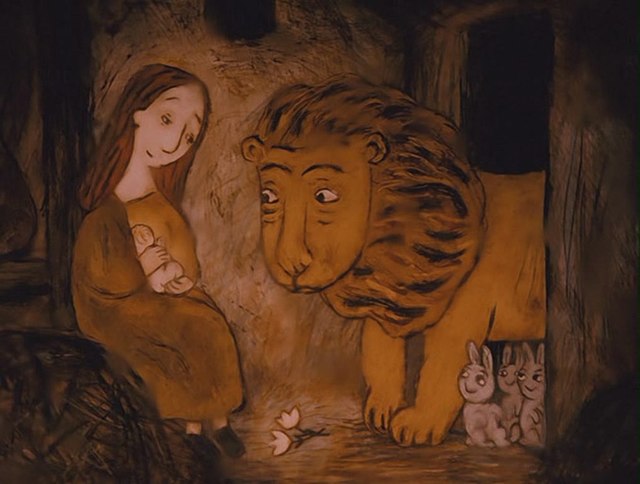
Рождество
Mikhail Aldashin’s pictorial meditation on the Nativity is so enchanting, so full of loveliness that it is an asceticism to keep it just for Christmas. This cartoon, made in 1996, is in the best sense naïf; that is, capable of seeing reality as it is, yet gloriously illumined. Works such as this one remind us what wonder means. It is vital to keep that faculty alive. Without it our view of the world is contorted, warped. For all its simplicity, which makes the story accessible to all, Aldashin’s film is full of subtle allusions to Biblical typologies, expository narratives, and great works of art. It makes us want to join the angelic band, even if our instrumental skill does not extend beyond the triangle. What does it matter! You can watch the film here.
Music in Church
How better to spend the Nativity Octave than by singing Bach’s Christmas Oratorio? Here is an excerpt from an interview with Cologne’s Domradio on the occasion of the Cappella Lacensis‘s performance tonight in the abbey church of Maria Laach. ‘Few people are indifferent to music as an expression of adoration and of worship. I think music can often be a door-opener, an awakener. In music we hear a call from beyond drawing forth from us an echo at once familiar and astonishing. Church musicians must be conscious that their contribution to the liturgy will often be as important as, sometimes more important than, a sermon. Therefore it must be made prayerfully. There is no room for mediocrity. The Christmas Oratorio is wonderful – we might call it heavenly! At the same time it is earthbound and unsentimental. That belongs to the mystery of Bach.’
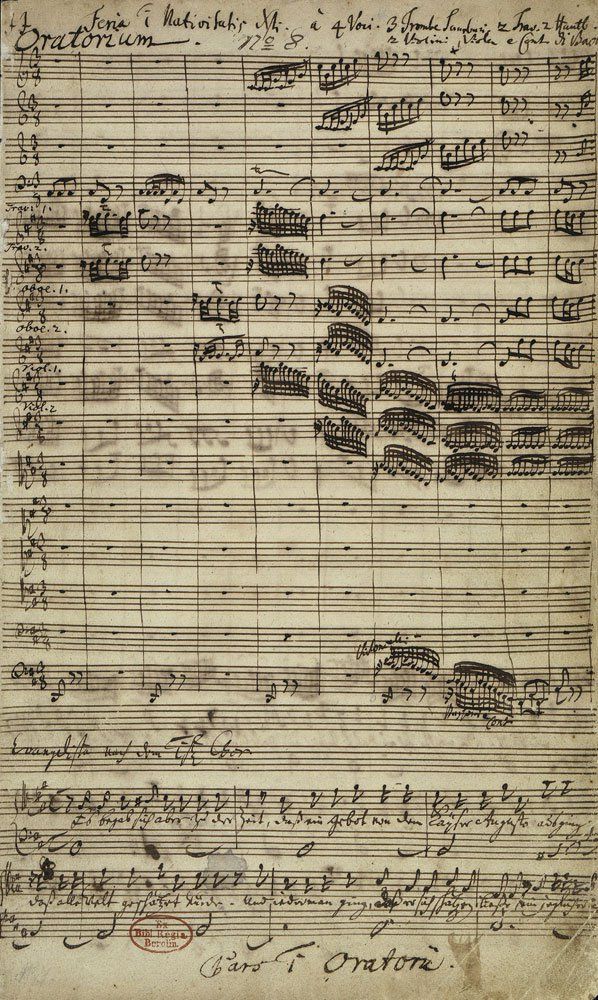

Desert Fathers
It may seem odd, even subversive, to launch an ascetic project on the eve of Christmas Eve; but it isn’t, really. For the core meaning of ‘ascesis’ is ‘exercise’, and what Christ’s Nativity does is to introduce into this world the possibility of living divinely, an art we must learn by practice. Thanks to a long, stimulating exchange with Exodus 90, a programme that has led the way to uncommon freedom for countless people, and to the cordial collaboration of EWTN, I am happy to announce the launch of ‘A Year with the Desert Fathers’ on this day. Find out more about the programme here, or visit the designated website, here.
Leavening
In August 1969, George Mackay Brown wrote to Stella Cartwright: ‘Dear Stel, not many people have to walk such a hard road. One feels desperate with solitude often; then it is salutary to know that one is not alone, but is “involved with mankind”. And that means, as I understand it, that whenever you are brave, enduring, uncomplaining, then the whole world of suffering is helped and soothed somehow. This is sacrifice, and fulfilment and renewal: an incalculable leavening.’ This ‘incalculable leavening’ is what Christmas, the incarnation of the Word, renders possible. Mackay Brown noted elsewhere that ‘in a sense, everyone is the writer’s concern. The whole of humanity is his family and he must participate in their joys and ennuis and sufferings, otherwise what he does would be as meaningless as an endless game of patience.’ Quotations are from Maggie Fergusson’s George Mackay Brown: The Life, of which A.N. Wilson wrote it was ‘the best biography of a poet I have ever read’.
